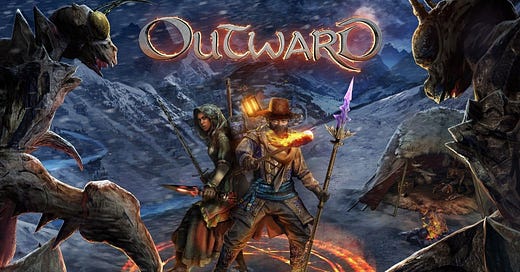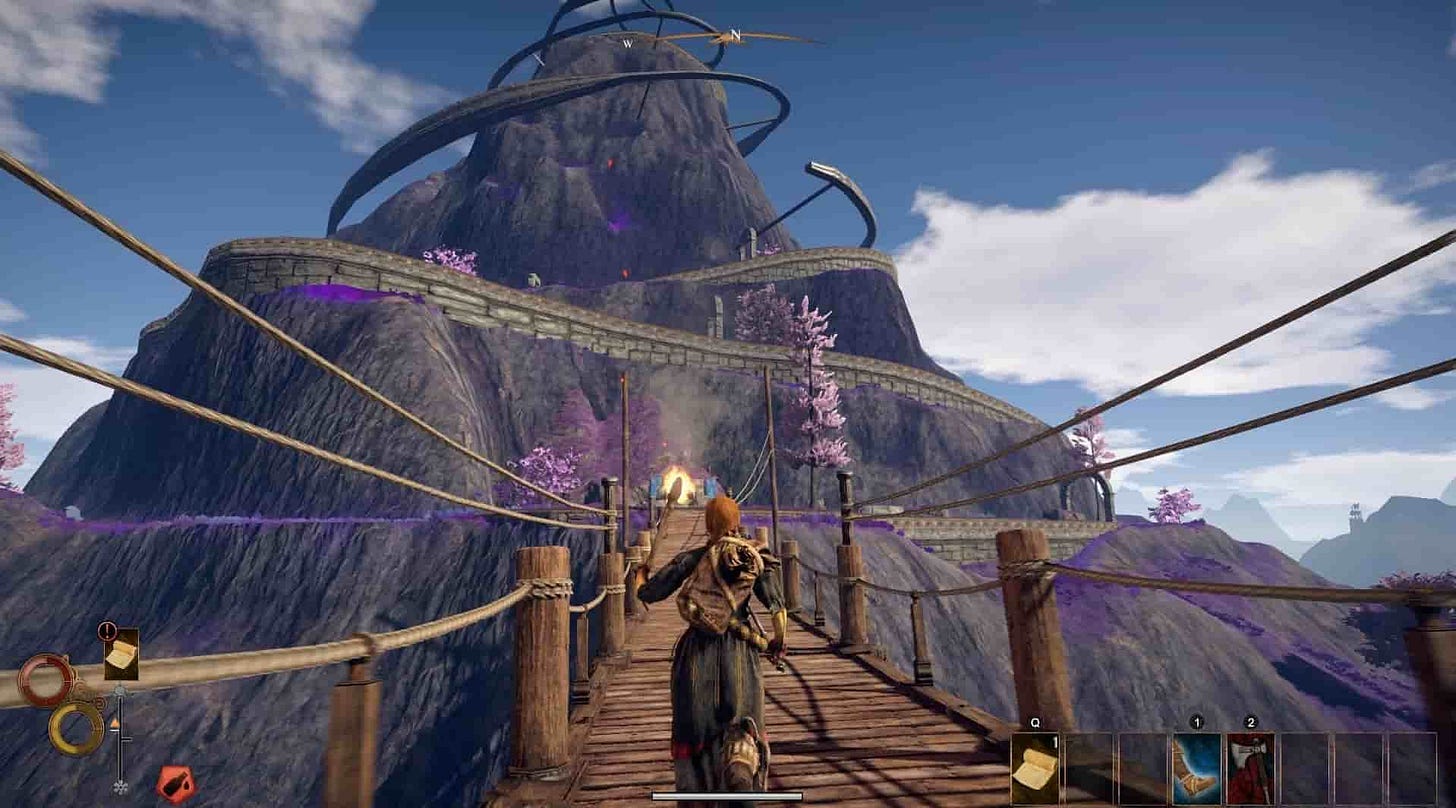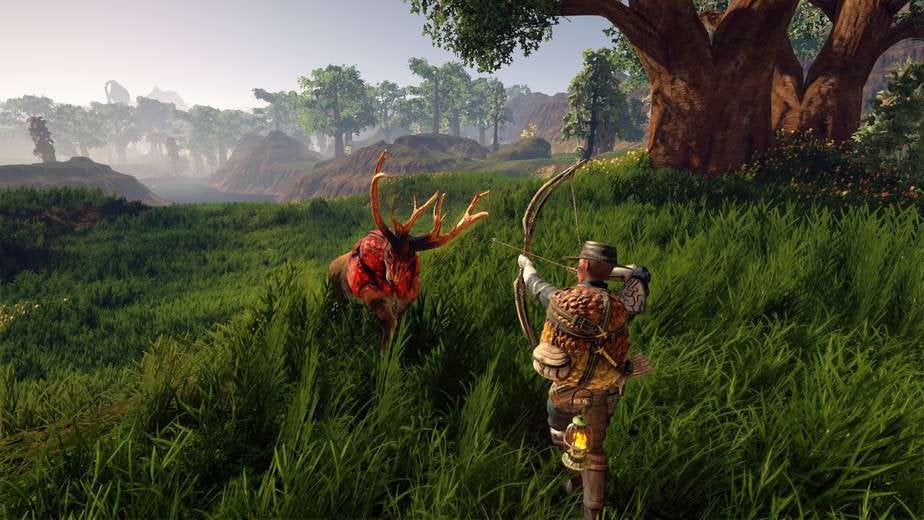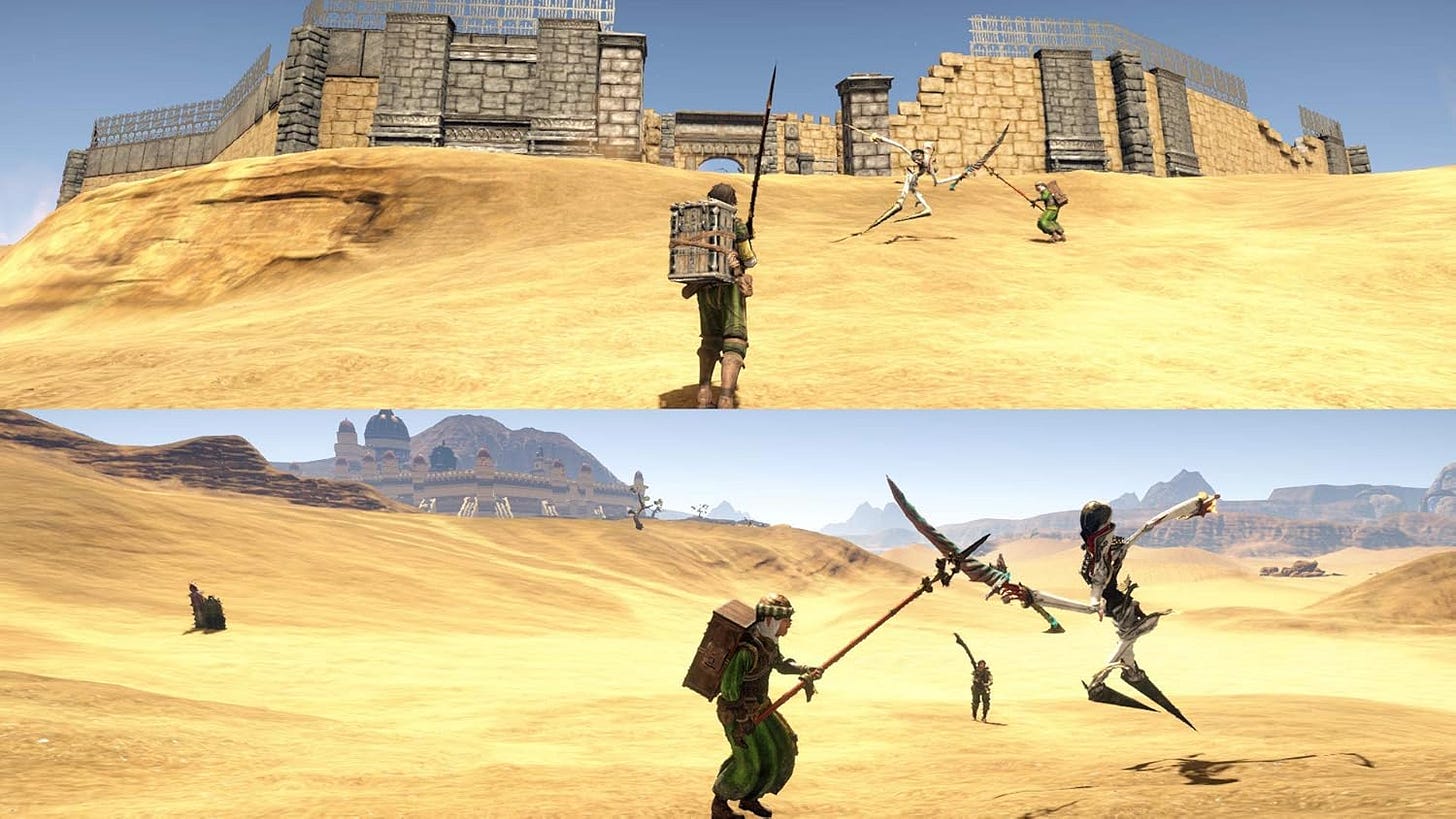Outward, a Quebecoise tale of shipwrecks, debts and survival
Developer: Nine Dots Studio
Publisher: Deep Silver
Director: Guillaume Boucher-Vidal
Soundtrack: Jean Francois Racine
Subgenre: Action RPG with an heavy emphasis on survival, also one of the very few Western local multiplayer RPGs, complete with an unusual split screen mode
Progression: After a quick introductive scenario, you are free to roam the world as you please and join whatever faction, each with its own quest line and point of view. Quests often have time limits, and you can keep playing after reaching the end state of each scenario, passing on some items for the next playthrough.
Country: Canada, Quebec
Platform: PC, PS4, XBO, PS5, XSX
Released: 26\3\2019
Status: Completed on 11\10\2022
Low-level play, with its mix of resource management, careful explorations of both locales and gameplay systems and hard choices in terms of character customization and equipment, can be extremely fun and provide plenty of so-called emergent narrative hooks, be it in tabletop or videogame RPGs. This is one of the reasons why the first few hours in any given dungeon crawler are often special, or why the first Baldur's Gate is a different and uniquely appealing experience compared to its sequel, even while accepting it’s a lesser complex game on a purely quantitative level.
Despite scrapping traditional RPG character growth, Outward very much feels like low-level play taken as the core concept for most of the experience, with survival and resource management taking center stage until the very last stretch of the game. Its developer, Quebec's Nine Dots team, also defined the game's core identity by choosing to provide a beefy local split screen multiplayer option, something I can't help but love on a conceptual level, especially as local co-op action RPGs are hard to come by outside of Mana, Tales, Salt and Sanctuary, Dragon Crown and a few console ports of Western hack&slash, but also something that likely damaged the game in terms of its purely single player potential by forcing its developers to make some hard choices regarding map design.
Copying Ys’ Adol Christin's shtick by starting as a poor chap that just experienced a devastating shipwreck, Outward's user-created protagonist soon after gets forced to pay up his family’s Blood Debt in order to avoid losing his seaside home in Cierzo, before finally getting a chance to travel freely and, theorically, fully experience the rather grim world he dwells in. In practice, though, it takes time to grasp the game's loop, the logic behind its progression and the amount of freedom you actually have in pursuing your goals.
Outward, after all, is all about the player filling the gaps: after solving your own personal housing crisis, or ignoring it if you aren't interested in having a lighthouse to crash in, you can go about joining a faction, which will trigger a surprisingly small number of quests before you reach an endgame state, where you can still play normally and leave items in special chests in order to give an edge to your next character. Between each of those steps are long hours of meandering, exploring, stacking resources, running away, wasting coins on items and skills (the only way to improve your characters), which, unsurprisingly, is where the meat of the game is.
Aside from the usual hiccups, Outward isn't as hard as it sounds, though: without even going back to the classics of old and their obscure systems and UI, even recent Western RPGs like Kingdom Come and Elex felt way harder in the beginning, with the former easily trumping Outward in terms of the initial struggles linked to its simulative elements, and the latter just being way harder as far as enemy encounters go, at least for the first stretch of Jax's adventure.
In fact, while Outward has your character drinking water, eating food, sleeping, getting and curing various illnesses, immediately bandaging wounds, managing your inventory's weight and your equipment's durability, minding time limits and dressing according to each region's climate, just to name the major hurdles, the real issue that can take players by surprise is its roguelite-style save system and death state: with auto saves and a single save slot which gets loaded depending on which one is more recent, you aren't able to keep a perfect state (outside of save scumming, obviously) and dying, while amusingly never being fatal due to a number of plot contrivances to explain why you wake up in a nearby city, can result in losing major progress in terms of money and inventory, which is definitely an issue since, as noted above, coins double as both trading commodities and factual experience points in Outward's game economy, and decent items are hard to come by.
Combat, a rather sluggish and wooden action-RPG affair based on the usual mix of stamina, dodges and variable attack strings that someone, somewhere will surely define as Soulslike, is not without its charm, especially if you are no stranger to Eurojank (or Quebecjank, I guess, since Outward was developed on the other side of the Atlantic) WRPGs, and does pose a challenge early on, making amusing skills like throwing lanterns as a Molotov cocktail sort of needed while in a pinch. In a game without levels and hard stats requirement, getting better weapons and armor is literally a game changer, and it amused me to no end how I went from running away and trying my luck with singling opponents for a dozen hours to throwing myself into the fray once I chanced into an absurdly overpowered magical lance.
Another trait I deeply appreciate in this kind of sandbox experiences is the possibility to experience most of the game before committing to the main quest, which is likely the best way to go given how challenging story quests can get if you tried to rush them right after leaving Cierzo, not to mention the potentially punishing time limits some missions have.
Unfortunately, the game's reliance on its survival mechanics to provide a feeling of adventure ends up being undermined by a number of factors. Likely due to the game's low budget mixed with the technical issues linked with keeping a smooth split screen experience, the game doesn't have an open world, but rather small regional maps that end up being fairly cramped and unexciting to explore. This can be justified in game by yet another surivivalist trait Outward adopts, never showing your position on maps, instead making you rely on geographical clues to reach your destination, but I feel that, whether the rationale behind this was a lack of resources or a choice, Outward's regions end up being too small, too focused on defined paths and, at the same time, very prone to backtracking due to the frequent need to offload useless but cumbersome treasures.
This isn't even mentioning how lifeless most of the overworld areas feel, with cities having their own separate maps and each wilderness area featuring maybe a lonely Soroborean merchant as far as NPCs go, an issue that is ramped up by the lack of non-combat interactions with human enemies, aside from a handful of quests. Even in cities, actually explorable buildings are painfully few, making those area feel way smaller than one thought at first glance.
Another, possibly larger issue, is that apparently Nine Dots thought that there was no need to provide a huge number of side quests: focusing entirley on emergent narrative, the game is largely lacking in NPCs providing anything of worth to do with your time, meaning that, once you have explored the world and gotten a decent equipment, story quests are often the only things left. While they do provide some freedom in the way you can tackle them and their outcomes, those are also mostly linear and follow each faction's story during a geopolitical upheaval that could undermine the foundation of the lands of Aurai.
While the game is far from story driven, I think it's fair to mention how one of Outward's unexpected positive traits is how unique some its setting's concepts feel: Aurai features a benevolent wizard ascended to godhood, Elatt, that actually tries to act in humanity's best interest and talks quite frankly with petitioners travelling to his main temple, a loose alliance of clans focused on the idea of familial responsibility rather than personal one (hence the initial conflict based on the protagonist's Blood Debt, which he can only cancel by leaving his community or by being adopted by another clan), an old, otherwordly menace that stays mostly hidden, the Ash Giants and their unique culture you will actually have to research, not to mention some positively bizarre twists, like a cowardly friend mistakenly devoting too much lifeforce in his pursuit to gain mana, ultimately ascending to Lichdom. Those ideas are often poorly introduced, poorly explained or both, possibly because of the lack of meaningful NPCs and side quests that could help to flesh out or foreshadow plot points, organizations or story events, but, still, it's interesting how the setting manages to often feel alien and quite different compared with more traditional fantasy settings. Also, in a stark contrast with far too many contemporary RPGs, Outward doesn’t try to be comedic in the slightest, and the somber note most of its dialogues strike actually help to make Aurai more believable, at the same time managing to avoid veering into proper dark fantasy territory.
In the end, Outward, a bit like its soundtrack, ends up feeling both grating and endearing for different reasons and, while I personally didn't feel like pursuing a second playthrough, I can at least say that Nine Dots' attempt at building a survival RPG of sorts didn't fall flat, despite a number of noticeable issues. Then again, I didn't have a chance to experience one of the game's major charms, the aforementioned split screen mode, outside of a very brief try, and the fact that Boucher-Vidal's team went out of its way to include such a forgotten and beloved feature despite it being likely used by a fraction of Outward's player base shows an uncommon, uncompromising vision that makes me interested in their future efforts.







